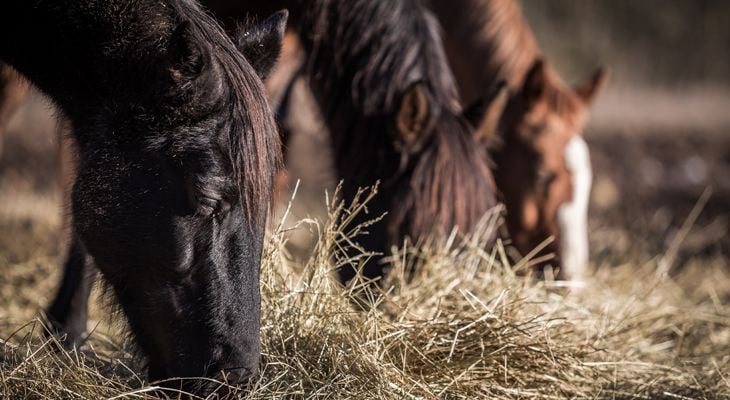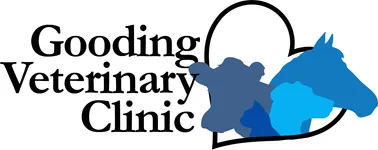
You can divide horse nutrition into six categories: carbohydrates, protein, fat, vitamins, minerals and water. If you get the right feed for your horse, it might take care of the first five. Supplement the feed with plenty of water, and your horse should have all of its needs met. However, to be sure that your horse is healthy and getting all required nutrients, you should first understand what a horse needs for optimal physiological function and overall health.
Carbohydrates
You can divide carbohydrates, usually the bulk of a horse’s diet, into two categories: structural, or fiber; and non-structural, or sugars and starch. Roughage, such as hay and grass, are structural carbs, and are your horse’s most important energy source.
Make sure that your hay is high quality, free of dust and mold and cut at the appropriate time. Hay that’s too thin or too coarse can cause digestive troubles. Overly mature hay has decreased nutritional value.
Protein
Protein is essential for your horse’s hair, hooves and muscles. Protein is made of various amino acids, all of which your horse needs. Horses usually require more lysine, so some feeds add extra amounts of this amino acid.
While people often think that protein gives energy, carbs are most efficient for an energy boost. Protein is more about growth and maintenance of muscles. The necessary amount of protein fluctuates depending on the age and workload of your horse. Growing horses, gestating mares and those in intense training need a higher level of protein in their diets. Feeding a horse too much protein results in extra ammonia in a horse’s urine. This can cause respiratory issues in the stable.
Fats
High-fat diets are a fairly recent trend among horse owners. Commercial feeds now range between 2 and 12 percent fat, usually in the form of stabilized oil. Fat is a good source of energy for horses. Because fat is higher in calories than carbohydrates, the feed will be denser and your horse will require less of it. Commercial feeds take this into consideration and balance nutrients accordingly. However, if you’re doing your own fat supplementation by pouring oil over your horse’s feed, check with your equine veterinarian to make sure all nutrients are in balance.
Vitamins
Your horse’s good health depends on getting the right amount of vitamins. Your horse synthesizes some of these vitamins — such as vitamins C and K and the B vitamins — on its own. Others come from feed. Horses in sunny climes can get vitamin D from sunning in the pasture. Read the labels on your horse’s feed to be sure that all necessary amounts of vitamins are present. If you’re not sure, talk to your equine veterinarian. Horses seldom need supplementation beyond their feed. Keep in mind that while it’s crucial to meet vitamin requirements, you don’t want to overdose your horse on vitamins, especially A, D, E and K, which are stored in fat.
Minerals
Your horse also needs the right amount of minerals. Major minerals include phosphorus, calcium, magnesium, chloride, potassium, sodium and sulfur. Necessary trace minerals are iron, zinc, selenium, copper, manganese, cobalt and iodine. Trace minerals are just as essential, but only very small amounts are required.
Mineral needs vary based on weight, age and special circumstances. For example, growing horses and lactating mares need more calcium than other horses.
Most feeds are in accordance with the National Research Council’s publication on nutritional requirements of horses. However, mineral quality in forages varies with plant species, soil content and harvest conditions. To be safe, send a sample of forage to a lab for analysis. Too little of a mineral can result in deficiency. Too much can result in toxicity. It’s important to get mineral content just right.
Mineral Deficiency and Thumps
Thumps is one equine problem that can result from a mineral deficiency. Low blood calcium levels can contribute to the thumping noise heard in the abdomens of certain horses after running long distances. Dehydration or low levels of potassium, sodium, magnesium or chlorine can also contribute to thumps.
Water
Depending on your horse’s activity level, the temperature and the humidity level in her environment, she may drink anywhere from 5 to 15-plus gallons of water per day. Your horse should always have plenty of clean, fresh water to drink. If this isn’t possible, provide your horse with water at least twice every day and allow her a few minutes to drink her fill. Dehydration, colic and other intestinal problems can all result from insufficient water intake.
Horse nutrition is a vital and sometimes confusing subject. If you need help ensuring your horse has the best, most balanced diet possible, call our office today.
